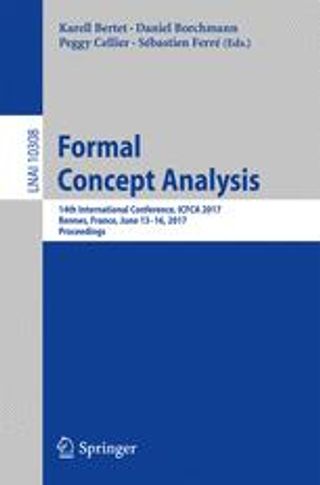?
On the Usability of Probably Approximately Correct Implication Bases
P. 72–88.
Borchmann D., Hanika T., Объедков С. А.
ПУБЛИКАЦИЯ ПОДГОТОВЛЕНА ПО РЕЗУЛЬТАТАМ ПРОЕКТА:
В книге

Vol. 10308. , Cham: Springer, 2017.
Junyu B., Fei H., Huilin F. и др., International Journal of Approximate Reasoning 2025 Vol. 187 Article 109541
Добавлено: 1 декабря 2025 г.
Дудырев Е. О., Mariia Zueva, Кузнецов С. О. и др., , in: FCA4AI 2024: The 12th International Workshop "What can FCA do for Artificial Intelligence?", October 19 2024, Santiago de Compostela, SpainVol. 3911.: CEUR Workshop Proceedings, 2024. P. 47–58.
Добавлено: 30 апреля 2025 г.
CEUR Workshop Proceedings, 2024.
Добавлено: 29 апреля 2025 г.
Канаев Е. А., Гараева А. Р., Fedorenko D. O., , in: Cooperation in Asia-Pacific: Transition to a New World Order.: M.: IOS RAS, 2025. P. 8–10.
Добавлено: 5 апреля 2025 г.
Дудырев Е. О., Кузнецов С. О., Napoli A., , in: FCA4AI 2023 What can FCA do for Artificial Intelligence 2023 Proceedings of the 11th International Workshop "What can FCA do for Artificial Intelligence?" co-located with the 32nd International Joint Conference on Artificial Intelligence (IJCAI 2023) Macao, S.A.R. China; August 20, 2023Vol. 3489.: CEUR-WS.org, 2023. P. 69–80.
Добавлено: 4 октября 2023 г.
Дудырев Е. О., Кузнецов С. О., Napoli A., , in: 17th International Conference, ICFCA 2023, Kassel, Germany, July 17–21, 2023, Proceedings. Formal Concept Analysis, (LNCS, volume 13934).: Switzerland: Springer, 2023. P. 127–142.
Добавлено: 4 октября 2023 г.
Канаев Е. А., Лузянин С. Г., , in: The global reset: insights from regions.: M.: Advanced Solutions, 2022. P. 4–11.
Добавлено: 11 июня 2023 г.
Канаев Е. А., Terskikh M., , in: The global reset: insights from regions.: M.: Advanced Solutions, 2022.
Добавлено: 11 июня 2023 г.
terskikh M., , in: The global reset: insights from regions.: M.: Advanced Solutions, 2022. P. 88–97.
Добавлено: 11 июня 2023 г.
Егурнов Д. А., Точилкин Д. С., Игнатов Д. И., , in: Complex Data Analytics with Formal Concept Analysis.: Springer, 2022. P. 239–258.
Добавлено: 1 ноября 2022 г.
Galitsky B., Ильвовский Д. А., Гончарова Е. Ф., , in: Proceedings of the 10th International Workshop "What can FCA do for Artificial Intelligence?"Vol. 3233.: CEUR Workshop Proceedings, 2022. P. 75–87.
Добавлено: 1 ноября 2022 г.
Дудырев Е. О., Кузнецов С. О., , in: Proceedings of the 10th International Workshop "What can FCA do for Artificial Intelligence?"Vol. 3233.: CEUR Workshop Proceedings, 2022. P. 23–34.
Добавлено: 1 ноября 2022 г.
Bansal S., Kailasam S., Объедков С. А., , in: Formal Concept Analysis: 16th International Conference, ICFCA 2021, Strasbourg, France, June 29 – July 2, 2021, Proceedings.: Springer, 2021. P. 107–122.
Добавлено: 9 декабря 2021 г.
Дудырев Е. О., Кузнецов С. О., , in: Proceedings of the 9th International Workshop "What can FCA do for Artificial Intelligence?" (FCA4AI 2021)Vol. 2972.: CEUR-WS, 2021. Ch. 9 P. 99–104.
Добавлено: 8 декабря 2021 г.
Бузмаков А. В., Кузнецов С. О., Makhalova T. и др., , in: Proceedings of the 9th International Workshop "What can FCA do for Artificial Intelligence?" (FCA4AI 2021)Vol. 2972.: CEUR-WS, 2021. Ch. 2 P. 19–26.
Добавлено: 7 декабря 2021 г.
Гончарова Е. Ф., Ильвовский Д. А., Galitsky B., , in: Proceedings of the 9th International Workshop "What can FCA do for Artificial Intelligence?" (FCA4AI 2021)Vol. 2972.: CEUR-WS, 2021. P. 51–58.
Добавлено: 28 октября 2021 г.
Springer, 2021.
Книга вклюает в себя работы 16ой международной конференции по Анализу формальных понятий. Книга поделена на 5 секций: теория, правила, методы и приложения, исследование и визуализация ...
Добавлено: 10 июля 2021 г.
Belfodil A., Кузнецов С. О., Kaytoue M., International Journal of General Systems 2020 Vol. 49 No. 8 P. 785–818
Добавлено: 25 января 2021 г.
Yarullin R., Объедков С. А., International Journal of Approximate Reasoning 2020 Vol. 127 P. 1–16
Добавлено: 6 октября 2020 г.
Махалова Т. П., Ильвовский Д. А., Галицкий Б. А. и др., , in: RAAI 2020 Russian Advances in Artificial Intelligence 2020 Selected Contributions of the "Russian Advances in Artificial Intelligence" Track at RCAI 2020 co-located with 18th Russian Conference on Artificial Intelligence (RCAI 2020)Vol. 2648.: CEUR-WS, 2020. P. 144–156.
Добавлено: 15 сентября 2020 г.